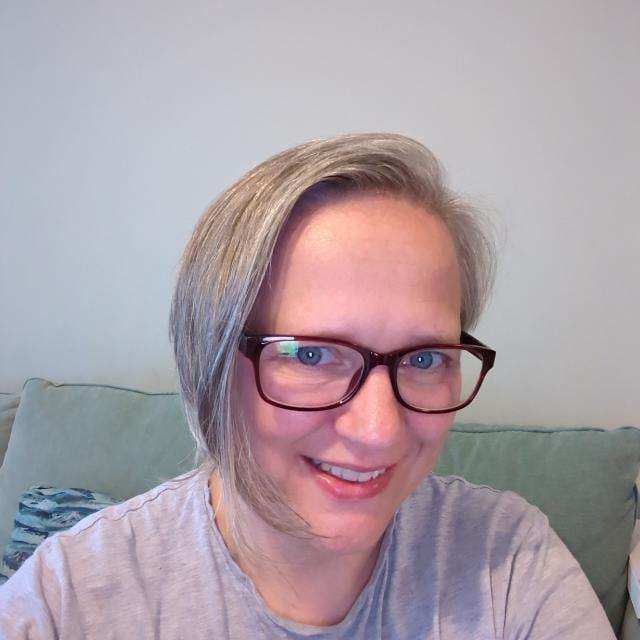(Self) interview with Harriet Cooper
I’m not famous enough for other people to interview, so I interviewed myself.
Who is Harriet Cooper, tabletop-games-translator extraordinaire?

What made you go into board game translation?
I love playing board games and I love creative translation, so it was an obvious fit. I’m very happy in my little translating niche, and I’m confident I do a good job: my clients are happy with my work, and sometimes even ask for me personally. I play a wide range of tabletop games with my family: battles with miniatures, long and complex eurogames, RPGs, card game fillers, some abstract strategy games… a bit of everything, really.
What do you love about your job?
The stories created by the game universes and the great artwork, alongside the challenge of making technical rules texts crystal clear, and finding just the right words to describe a scene. Plus it’s fun working with other tabletop gamers, who are a charming, friendly bunch of people who love coming together for a game or two of good-natured fun. But then I would say that…
What is stressful/difficult about your job?
Short deadlines, incomplete information and projects that are still a work-in-progress. It’s much easier to get a consistent, well-polished translation if the original source text is itself consistent and complete. Having the images is key, especially with eurogames, where the components themselves can convey a lot of information about the game mechanics. I like working in a translator-proofreader team because it gives you someone to bounce ideas off, to make sure you’ve explained the rules as clearly as possible and to share the pressure of double-checking / triple-checking everything is exactly where it should be.
Will AI take your job?
Not for the time being, I would argue; at least in terms of game translations. I’m thinking through the gameplay as I translate, so I can spot where there’s a loophole or where a clarification is needed, and that’s something AI can’t do at the moment. We all want to avoid people’s game time being interrupted as someone searches for clarification on BGG or Reddit, regarding some edge case or where the explanation in the rules isn’t crystal clear. The other thing AI can’t do is create narrative pace and tension, because it doesn’t have an active imagination, like yours truly does…
What was your favourite game to translate?
I don’t have a favourite per se – they’re all “my children”, as the saying goes. I do like translating a good narrative though, or a well-balanced eurogame that requires some careful thought to communicate all the mechanics effectively. Probably my favourite part of translating games is when I have to come up with an equivalent English name for a monster, or rewrite a riddle because it’s based on the source language and so needs adapting.
Which games are you particularly proud of translating?
Three games stand out in particular:
I was stoked when Critical Foundation won the Judges Choice Best RPG at the UK Games Expo, because the text guides the GM through the gameplay, so each scene has very concise paragraphs of narrative where you only have 2-3 sentences to immerse the players in the game universe and move the storyline on, followed by concise game instructions for the GM. I love the challenge of switching quickly between technical gaming jargon, compelling narrative text and punchy marketing blurbs.
I’m also proud of my edit of Primal: The Awakening. It’s a mammoth game that raised over € 2m on Kickstarter, and was a complex and challenging edit, due both to the size of the game and its intricate mechanics. Consistency checking the 120 page main rulebook, several expansion rulebooks and hundreds of cards was a mammoth task on its own: I discovered that Adobe has a limit on how many comments you can add to a document. It’s a beast of a game (pun intended), and I enjoyed how it pushed my editing skills in various ways.
The third game I’m proud of is Malhya, another hefty-sized game. I translated a good number of the scenarios, and proofread some of the others. What I enjoyed most about Malhya was making sure I crafted an immersive narrative that compels players to find out what happens next. It was when I was translating Malhya that I came up with my popcorn analogy: when I was doing a final read-through of one of my translated episodes, I realised that I wanted to shovel popcorn into my mouth as I was reading it, because the narrative was so captivating. Now I aim to achieve that ‘popcorn moment’ when I’m translating narrative text, because that’s exactly the enjoyment players are looking for in a game. It was always exciting to find out how the story would unfold in the next scenario, and to see the characters come to life in English. Plus it was fun to ‘flesh out’ the characters in writing, by describing the sound made by the imaginary creatures, for example.
What else have you translated?
I started out by translating numerous marketing and internal documents for charities, especially for Enterpreneurs du Monde (a brilliant French NGO), and I still translate documents for them, from time to time. My first pieces of paid translation work were part of a history project for a university (which was fascinating), and I’ve also translated a lot of clothing descriptions. In recent years, the majority of my work has been translating and editing tabletop games. Gotta love what you do… 🙂
Ideal gaming weekend?
Ooh, now you’re asking… Probably something like the following:
Saturday: warm up with Worms, then 40k.
Evening (depending on beer consumption): Arkham Horror or Really Nasty Horse Racing Game. Finished off with Turn the Tide.
Sunday: X-Wing. Brass in the afternoon (B’ham?), then a quick Dorfromantik before everyone heads home.
But ask me next week and I’ll probably give a different answer. It depends what my current favourites are.
What are you doing, when you’re not translating?
When I’m not playing something with miniatures or cute wooden figures with my family, then I’m playing Chopin on the piano, making something with wool, reading or writing fiction/poetry. I’m also learning to mix electronic dance music. Weirdly, loud drum and bass helps me concentrate while I’m translating… I’m a naturally noisy soul.

